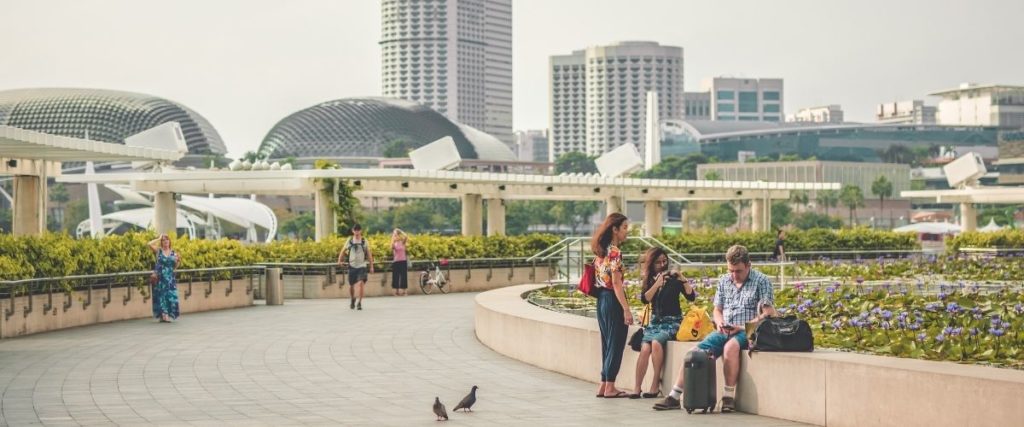From air-purifying paint to beer made from bread, here are 8 sustainability startups in Singapore to look out for in 2021.
Singapore is becoming one of the most environmentally sustainable nations in the world, taking pride in their “Garden City” title, coined by the late Lee Kuan Yew in 1967. Although the Covid-19 pandemic has put a hold on many industries, the country’s sustainability plan is continuously thriving. Singapore’s Green Plan 2030 just announced more improvements to be made by the city including increasing the need for electric vehicles, transforming recreational spaces to become carbon neutral destinations, and further development of their upcoming Forest Towns. With this new direction, here are 8 sustainability startups in Singapore working to shape environmentally conscious living in the city.
Clean Energy
1. Ecoworth Tech
Ecoworth Tech is a waste-to-worth solutions startup that transforms waste materials into reusable products. Their Carbon Fibre Aerogel (CFA) is made from raw cotton, a non-toxic, recyclable, and natural material used to absorb organic material from waste water. Through absorbing those products, they then will use it to produce various cellulose-based materials like cotton or paper. Using the CFA technology, Ecoworth Tech hopes to clean up liquid industrial waste.

2. Transkinetic
Transkinetic’s new technology, Moventic, is a smart road hump that absorbs kinetic energy from cars and transforms it into clean energy. The purpose of this invention is to transform every road into a sustainable power source, to help reduce the world’s dependence on natural resources. Transkinetic is working with the National University of Singapore’s Department of Engineering and is funded by government agencies and regional venture capitalists.
3. Green Koncepts
Using internet of things (IoT) solutions and cloud-based systems, Green Koncepts tracks energy consumption for real estate companies. Its mission is to create an affordable and sustainable solution to not only reduce your company’s carbon footprint, but also to use as leverage in a growing competitive market. Green Koncepts has tracked over 800 energy million transactions for their growing database.
Lifestyle
1. ChopValue
Each year, 1.4 billion people throw away 80 billion pairs of chopsticks, and China produces 45 billion pairs- the equivalent of 25 million trees being cut down. Deforestation causes climate change, reduced crop output, and increased greenhouse gas emissions. ChopValue SG is the world’s first circular economy franchise, originating from the company’s base in Vancouver, which was founded in 2016 as a startup that upcycles single-use bamboo chopsticks into furniture and other interior decorations. Currently, ChopValue has already partnered with multiple restaurants and have recycled over 33 million chopsticks.

2. Gush
92% of the air we breathe contains pollutants like carbon monoxide, ozone, and nitrogen dioxide. Poor air quality can cause irritation to the eyes, nose, and throat, shortness of breath, asthma, respiratory conditions, and an increased risk of developing cardiovascular diseases. Wanting to change indoor air quality, Gush created an odourless, sustainable paint that purifies air. The paint can also regulate humidity, prevent mould, contains no volatile organic compounds (VOC), and eliminates 99.9% of bacteria. In addition to creating a clean indoor environment, Gush has also committed to planting 10 trees per house painted through Eden Reforestation Projects. Since 2017, Gush has raised US$2.1 million in funding from the property group City Development Limited SG.
3. Aerospring Hydroponics
A vertical garden is the result of growing plants vertically on a suspended panel using hydroponics. Aerospring Hydroponics designed a simple and low maintenance vertical garden for those who are living in areas with less space. After realising the limited options of locally grown produce and expensive organic products, founders Thorben Linneberg and Nadine Keller have created a sustainable food system out of a 3D printer. One small correction though just for your reference – we started out with prototyping the system in a 3D printer back in 2015 and of course grew plants in the printed modules until we finalised the design. Once they had perfected the design and function of their system, they created injection moulded tools, so every Aerospring can be locally produced in Singapore. Each vertical garden is designed to be able to fit into any balcony and can grow healthy, nutritious, and pesticide-free foods like basil, chives, passionfruit, and spring onions.

FoodTech
1. OnlyEg
Asia produces over 65% of eggs globally, with the average Japanese individual consuming 320 eggs annually, and the average person in China consuming 300 per year. Egg production accounts for high levels of carbon dioxide, methane, and nitrous oxide (greenhouse gas) emissions, and producing eggs also causes contamination of soil and the water we drink. Each year, the egg industry kills 6 billion “waste” male chicks because they are deemed useless. OnlyEG is a FoodTech startup created to produce a plant-based whole egg substitute. Their egg is a sustainable option that also contains nutritional value that matches a whole chicken egg, without any cholesterol, hormones, and drug residue. Just last week, OnlyEG gained US$1.7 million funding in a seed round from Insignia Ventures Partners and DSG Consumer Partners.
2. CRUST
CRUST, a FoodTech startup in Singapore, was founded in 2019 by Travin Singh, a self taught home-brewer. With a mission to reduce food waste by 1% by 2030, CRUST turns surplus ingredients like bread, cereal, malt, and fruit peels into beer and other non-alcoholic beverages. With creative beer names combined with unique ingredients, CRUST is hoping to expand to the hotel industry in other countries like Japan and Europe.

Related Articles
Your Guide to AgriTech in Singapore





